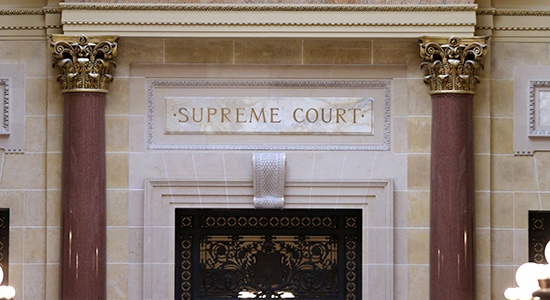
Feb. 22, 2018 – The Wisconsin Supreme Court today denied a petition that sought to change how the State Bar of Wisconsin uses mandatory dues.
Madison attorney Steve Levine filed petition 17-04 last year on his own behalf. The petition asked the court, which created the integrated State Bar, to establish a bifurcated State Bar budget consisting of both mandatory and voluntary member dues.
Under Levine’s plan, mandatory dues would fund specific activities – a lawyer assistance program, an ethics program, rulemaking activities, administration of the Client Protection Fund, and other “regulatory” programs approved by the court.
Voluntary dues (if available), under Levine’s proposal, would have funded all other State Bar activities, including member service programs like Practice 411™. In addition, programs to improve the delivery of legal services to the public, such as the State Bar’s access to justice and pro bono programs, would have required voluntary funding, as well as member benefits like Fastcase® and the Wisconsin Lawyer™ magazine.
About 45 percent of the State Bar’s budget is funded by mandatory dues. Educational products, services and programs, including CLE, fund the remainder. But the organization relies on mandatory dues to fulfill its mission to members and the public.
Many State Bar programs and activities are designed to aid the courts and to educate the public about the legal system, in addition to serving the needs of its members.
Lobbying a Sticking Point
Levine, a former State Bar president (2006-07), has challenged the mandatory bar as a party to and/or counsel more than 15 times since 1980. In his most recent petition, one of his major arguments was that members should not be compelled to fund State Bar lobbying activities because some members may not agree with State Bar positions.
Under Keller v. State Bar of California, 496 U.S. 1(1990), and subsequent rulings, mandatory bar associations can use compulsory dues to fund activities “necessarily or reasonably related to the purposes of regulating the legal profession or improving the quality of legal services.” Keller is codified in Wisconsin SCR 10.03(5)(b)1.
Under Keller, the State Bar is permitted to fund lobbying and other activities related to these purposes with mandatory dues. But lobbying and other activities not germane to those purposes cannot be funded with the compulsory dues of objecting members.
Every year, the State Bar – through an extensive accounting and review process – calculates nonchargeable dues, which are the cost of State Bar activities that could potentially fall outside the purposes noted in Keller.
Every year, objecting State Bar members may opt to receive a “Keller dues rebate amount” on annual dues statements, which is a pro rata amount that reflects activities, including lobbying, that potentially fall outside of what is permissible under Keller.
Levine’s latest proposal for a hybrid dues structure was not based on any change in constitutional law. Instead, he was asking for a bifurcated approach, despite Keller.
State Bar Board of Governors Changes Rebate Policy
On Feb. 9, the State Bar’s Board of Governors adopted a new policy on the Keller dues rebate amount, the pro rata amount members can withhold from annual dues.
The pro rata portion that members may withhold from annual dues ($9.95 for FY 2019) will now reflect all expenditures for direct State Bar lobbying activity.
Specifically, the annual Keller dues rebate calculation will include expenditures that relate to activities that constitute direct lobbying on policy matters before the Wisconsin Legislature and U.S Congress, “regardless of whether they would otherwise qualify as chargeable under a Wisconsin Keller dues analysis.”
Thus, although the Wisconsin Supreme Court has now denied Levine’s petition, the State Bar will no longer use mandatory dues to fund direct lobbying activity.
Related Articles
Board Adopts Policy on Dues Rebate Amount, Supports Pro Hac Vice Exemption– WisBar News (Feb. 9, 2018)
Supreme Court Hears Petition on Bifurcated State Bar Dues Structure – WisBar News (Oct. 31, 2017)
